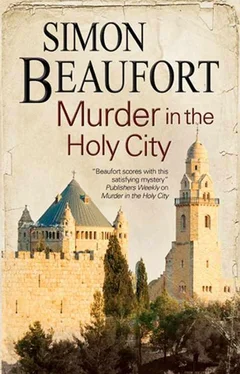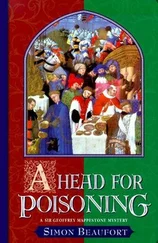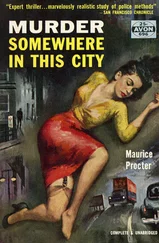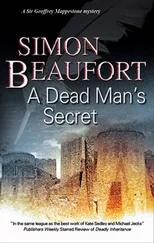Simon Beaufort - Murder in the Holy City
Здесь есть возможность читать онлайн «Simon Beaufort - Murder in the Holy City» весь текст электронной книги совершенно бесплатно (целиком полную версию без сокращений). В некоторых случаях можно слушать аудио, скачать через торрент в формате fb2 и присутствует краткое содержание. Год выпуска: 0101, Жанр: Исторический детектив, на английском языке. Описание произведения, (предисловие) а так же отзывы посетителей доступны на портале библиотеки ЛибКат.
- Название:Murder in the Holy City
- Автор:
- Жанр:
- Год:0101
- ISBN:нет данных
- Рейтинг книги:3 / 5. Голосов: 1
-
Избранное:Добавить в избранное
- Отзывы:
-
Ваша оценка:
- 60
- 1
- 2
- 3
- 4
- 5
Murder in the Holy City: краткое содержание, описание и аннотация
Предлагаем к чтению аннотацию, описание, краткое содержание или предисловие (зависит от того, что написал сам автор книги «Murder in the Holy City»). Если вы не нашли необходимую информацию о книге — напишите в комментариях, мы постараемся отыскать её.
Murder in the Holy City — читать онлайн бесплатно полную книгу (весь текст) целиком
Ниже представлен текст книги, разбитый по страницам. Система сохранения места последней прочитанной страницы, позволяет с удобством читать онлайн бесплатно книгу «Murder in the Holy City», без необходимости каждый раз заново искать на чём Вы остановились. Поставьте закладку, и сможете в любой момент перейти на страницу, на которой закончили чтение.
Интервал:
Закладка:
Simon Beaufort
Murder in the Holy City
PROLOGUE
Sir Guibert of Apulia’s head snapped up from the ground, and he was alert instantly as he heard the cry outside his tent.
“Saracens, Lord, Saracens!”
Snatching up his sword, Sir Guibert threw open the flap to the tent. The darkness was broken only by the low-burning fire and the streaks of light in the sky preceding dawn. Guibert quickly took in the scene.
His small camp was being attacked from all sides. If the sentries forming the triangle outside the camp were therefore already lost, only his sergeant, Adhemar, and the other nine men of his party of fourteen were left. He could not tell with certainty, but there appeared to be at least fifty Saracens pouring into his camp.
“Draw closer together, and stand back to back,” Guibert yelled to his panicking troops. Adhemar and two of the men formed a small cluster, but it was already far too late. Awakened from deep sleep after a rapid and thirsty march, his weary force was unable to form an effective defense and was being quickly overwhelmed. Guibert had bivouacked miles away from the guarded supply routes, because his delicate mission had demanded both secrecy and haste. Out here in the desert, there was no help and no retreat.
“Apulia!” Guibert yelled the war cry of his house and waded into his enemies, sword in one hand and dagger in the other. His prodigious fighting talents, which had earned him the nickname “Guibert the Two-Handed,” allowed him to drop four of the enemy as he slashed his way toward Adhemar. But, with blows falling from all sides, his light chain-mail shirt, which he had worn because it was less cumbersome than a full set of armour, was rent by several determined thrusts. He saw his sergeant and the last of his men fall, and then Guibert himself was struck down by a blow to the neck.
As he crumpled to the ground, his last thought was that he should not have braved the dangers of the Saracen-infested desert wearing only a mail shirt and leather leggings. Such light protection enabled him to ride with far greater speed, but what use was haste when he would not live to see his mission accomplished? And then the pale light of dawn was blocked by the Saracens who fell upon him, and he knew no more.
CHAPTER ONE
JERUSALEM, JULY 1100
The small band of soldiers glanced around uneasily as the scream rent the air a second time, clear and piercing. One or two fingered the hilts of their swords as they marched, and all were tense and wary. Although the street was deserted in the blazing midday sun, whispered voices and flickers of movement came from the huddle of houses that stood in an unruly line along the side of the road. Further ahead, a babble of hysterical voices exploded into the silence, and a dog began to bark furiously. Sir Geoffrey Mappestone exchanged a glance with Will Helbye, his sergeant at arms, and raised his hand to bring the soldiers to a halt. Nervously, the men shuffled to a standstill behind him, and Geoffrey heard the discreet rasp of steel on leather as weapons were drawn.
“I suppose we should investigate,” muttered Helbye, not looking at Geoffrey, but scanning the street with eyes alert for the signs of an ambush, “although I would sooner head straight back to the citadel. The men are exhausted after two weeks of desert patrol, and so am I.”
Geoffrey nodded in agreement, but led the way toward the cacophony of voices, his men falling in behind him. Their feet kicked up small clouds of dust as they walked, adding to the layers of yellow-white powder on their boots and powdering their faces and hands with a familiar grittiness. Geoffrey reached the end of the road and stopped a second time.
To the left, a small alley ran downhill, disappearing into the deep shadow of shabby buildings that had been built so close together that they almost met to form an arch overhead. To the right was a wider street, where larger, grander houses suggested that this area had once been home to some of Jerusalem’s more wealthy citizens. In the middle of the road, a woman stood, swathed in black from head to toe and clutching a long curved dagger in both hands. The dagger, Geoffrey noticed immediately, was bloodstained. Other people had formed a circle around her and were chattering in loud, excited voices.
Gesturing for his men to remain where they were, Geoffrey strode forward, with Helbye at his heels. Seeing heavily armed soldiers bearing down on them, the crowd parted quickly to allow them through, and the babble of voices died away.
“What has happened?” asked Geoffrey in Norman French, addressing his question to the woman, since she was obviously the cause of the incident.
She gazed at him with frightened eyes until someone in the crowd translated the question into Greek. She glanced at the interpreter and forced herself to look at Geoffrey again.
“There is a dead knight in my house,” she said, her voice low and unsteady. She looked down at the knife in her hands, as if seeing it for the first time, and flung it away from her in horror. It clattered at Geoffrey’s feet. Someone relayed her response to the onlookers, and a thrill of excitement rippled through them. All eyes turned expectantly to Geoffrey.
“Oh Lord!” breathed Helbye in Geoffrey’s ear. “The woman has done away with a knight, Sir Geoffrey. Now what do we do? After two weeks of chasing infidel robbers in that hell they call the desert, you would think we could go home quietly to rest and drink cool wine. But no! We are confronted with a killer of knights. Is it a trick? If we arrest her, will we be attacked?”
Geoffrey did not answer, but looked beyond the crowd to see whether he could detect any telltale signs of activity that might forewarn him of an ambush. Helbye was right to be suspicious and reluctant to become involved. It was only a year since Jerusalem had fallen to the Crusaders, and thousands of its people had been massacred in a way that still made Geoffrey-a hardened and experienced soldier-sick with disgust. The city, despite so few of its inhabitants having survived the sack-or perhaps because of it-was uneasy, and there were pockets of resistance to Crusader occupation everywhere.
“What is your name?” Geoffrey asked the woman in Greek. She looked startled to hear him speak to her in her own tongue, and it was some moments before she replied.
“Melisende Mikelos,” she replied in a low voice.
“Show me this dead knight, Mistress Mikelos,” he said, fixing her with a hard stare. He gestured with his hand that she was to precede him back into the house. Her eyes opened wider still, and she backed away from him in terror.
“No! Please!” she cried. “Please don’t make me go back in there!” She looked as though she might run away, but the spectators hemmed in close and allowed her no escape.
“Do you live here?” asked Geoffrey, watching her closely. Warily, she nodded. “Then you will have to go back inside at some point. Unless you wish to abandon your house to looters.”
She gazed at him pleadingly. “I would rather wait here until you have removed the … body from my home,” she said. “I will enter again when it is gone.”
“You must enter now, with me,” said Geoffrey, his patience beginning to fray. The longer he stood negotiating in the street with this woman-who may well have committed murder-the longer he put his men in unnecessary danger. When she did not move, he stepped forward and took her firmly by the arm. She struggled automatically, but he was strong, and she desisted as soon as she realised she could no more escape from him than fly.
Helbye motioned for three of the soldiers to enter the house with Geoffrey, while he stayed outside with the remainder, arranging them in two groups to make an ambush more difficult. Geoffrey’s fat, black-and-white dog found a patch of shade and flopped down in it, its sides heaving vigorously and its long pink tongue dangling out of the side of its mouth.
Читать дальшеИнтервал:
Закладка:
Похожие книги на «Murder in the Holy City»
Представляем Вашему вниманию похожие книги на «Murder in the Holy City» списком для выбора. Мы отобрали схожую по названию и смыслу литературу в надежде предоставить читателям больше вариантов отыскать новые, интересные, ещё непрочитанные произведения.
Обсуждение, отзывы о книге «Murder in the Holy City» и просто собственные мнения читателей. Оставьте ваши комментарии, напишите, что Вы думаете о произведении, его смысле или главных героях. Укажите что конкретно понравилось, а что нет, и почему Вы так считаете.












